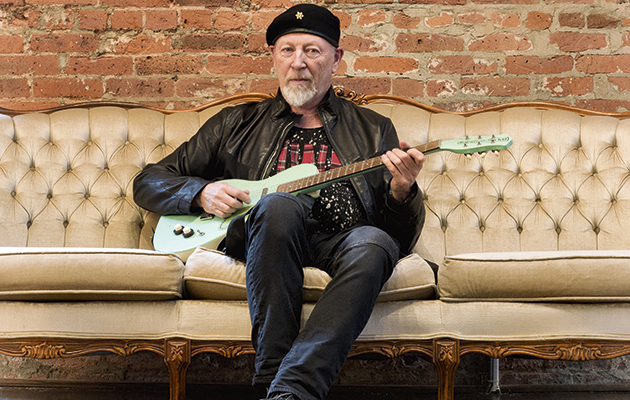13 Rivers is pretty stripped down. Did that come in response to the songs?
Stripped down is the approach I usually go for. If it sounds more like that, then it’s to do with the structure of the songs. Sometimes you get a song and you think, ‘Wow, that’d be great with a little more on it.’ So you start sticking on a few more guitars, get it nice and chimey, and then, ‘It needs more vocals…’ I think songs tell us what they want, and for the most part on this record the songs were saying, “Could you just leave us alone?”
You produced this yourself – did you nick any techniques you’d learnt from Buddy or Jeff?
I wouldn’t say techniques as much as attitude. Jeff Tweedy was really good at getting to the essence of a song. He’d say, “I think the groove’s a little bit wrong, take out that bass drum beat there…” I’ve done things with the engineer on this record before, Clay Blair, so I knew the sound he’d go for, and I was really happy about that. We didn’t do a lot of takes – two or three on most things. There’s a lot of sloppy soloing, but it’s the spirit of the thing. We’re not going for perfection here, we’re going for emotion. I always think a really bad note is an extreme of emotion that you just have to live with.
Lyrically, there are references to natural disasters – earthquakes, storms – and even Armageddon “in the mirror”. Where do these come from?
I don’t know. “The Storm Won’t Come” is a longing for a change to come in your life. In “Bones Of Gilead” it’s like love is gonna hit you on the head… the process is going to be traumatic but the outcome is positive. I say to the listener, make of it what you will, which is a great cop-out. Sometimes you finish a song and think, ‘Where did that come from?’ It’s like poetry; it’s not nailed down and not fully conscious, but somehow that communicates to other people. Sometimes you can make a career out of that! And sometimes you can’t. I’m not always that obscure, but sometimes this stuff does come out of this dream landscape.
You use Biblical references quite a bit – “The Rattle Within” mentions Jesus, and there are various Gileads in the Bible [“Bones Of Gilead”]. Knowing your religious beliefs, how are you employing these?
I’m really using them as cultural references for people in the West. The King James Bible is one of the great works of poetry in the English language. Even though I’m not a Christian I love the language of it, and the spirituality of it.
Your religious beliefs are clearly important to you, but you don’t seem to often address them in your music.
It’s all in there – you can’t fail to reflect your own morality in what you write. It has to be in there, and I know it is. But I don’t like people beating me over the head with their beliefs; I find it repulsive, so I try not to do it to other people. I hope what I do is non-dogmatic and subtle. My songs are more about the human heart and the human condition than they are about religious factions.
Is it a strange time to be a Muslim in America?
Well, not yet. It might get stranger soon, who knows? If it becomes more authoritarian, then I think it’ll get dangerous. At this point, there are so many unravellings of so many strands that it’s hard to say which way the cards will fall. Hopefully, people will come to their senses and restore some morality and order. But right now, it’s just weird.


